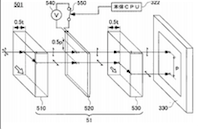To optical low-pass filter or not? Nikon files tech patent that allows camera to turn anti-aliasing on and off
posted Thursday, August 29, 2013 at 3:00 PM EDT

Judging by the actions of camera manufacturers of late, it appears we're in the midst of something of a backlash against the optical low-pass, anti-aliasing filter. Long used to reduce moiré in photos and video at the slight cost of sharpness, more and more digital cameras are now shipping with the low-pass filter either optional or removed. Nikon offered the D800 both with and without anti-aliasing, as did Pentax with the K-5 II and K-5 IIs, and even more recently Sony with the RX1 and RX1R. Fujifilm did something similar with its X-Trans sensor, and the Nikon D7100 has no low-pass filter at all. And that's just the tip of the iceberg.
It's clear camera makers think there's a market here for photographers who want the sharpest image possible, regadless of the risk of moiré. However, rather than continuing to make two variant models, Nikon has apparently considered taking it a step further and submitted a patent for user-controlled anti-aliasing functionality that a photographer can turn on or off as neeeded.
The patent was recently submitted by Nikon Japan, and unfortunately reading machine translated versions of the news makes it very hard to pick apart how exactly the company plans to implement the technology (assuming it ever becomes a reality). But there's no doubt that Nikon has an interest in making cameras without low-pass filters, and having one that you could switch on and off is appealing. You could use the filter when moiré might be an issue -- often problematic when recording video -- and shut it off when you're looking for the best resolution. And that means you'd no longer have to decide between two slightly different camera models (or have to buy them both).
As with most patents, this innovation might not ever come to market, but if Nikon were able to get it working well, it certainly could make the next generation of their enthusiast cameras more flexible for a variety of shooting needs.
(via NikonRumors)
